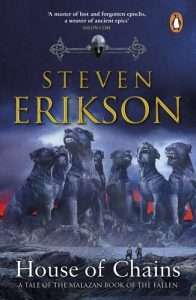REVIEW: House of Chains by Steven Erikson
Full of sand, blood, and philosophy, Steven Erikson’s House of Chains is the most straightforward Malazan: Book of the Fallen entry, meaning that it’s extremely complex and confusing. Still, Erikson’s gorgeous prose, wry dialogue, bloody action, and awe-striking worldbuilding makes the journey worthwhile while the curtain is pulled back ever further.
 “One day, perhaps, you will see for yourself that regrets are as nothing. The value lies in how they are answered.”
“One day, perhaps, you will see for yourself that regrets are as nothing. The value lies in how they are answered.”
With Memories of Ice being the sequel to Gardens of the Moon, House of Chains is the direct sequel to Deadhouse Gates. Allegedly this odd structure happened because Erikson had a computer failure after writing the first few hundred pages of Memories of Ice, but it does create an uneven flow. The Chain of Dogs was relentlessly tragic, the battle of Coral unbelievably epic, and then were placed back in the desert, searching for purpose amidst the sand. It feels intentional, as we spend most of our time with the characters being given confusing—and seemingly futile—tasks. Erikson, as always, asks for your trust, and you simply have to read and find out to start to gain some vision into the core plot of Malazan.
Now, you may notice that I said House of Chains is the most straightforward Malazan book, and then I immediately went into talking about the confusion in the desert. While it’s true that we spend a bulk of the time in the hazy heat and parching thirsts, what makes this novel more straightforward is where we spend the first one hundred and fifty pages; one POV: Karsa Orlong.
“You have learned much, Karsa Orlong.”
“I have, T’lan Imass. As you shall witness.”
Witness is a phrase you’ll hear frequently from the Tobalaki known as Karsa. He’s a brute, straightforward and eager for blood. But he’s more than that, or at least, he becomes more than that. Karsa’s journey is arguably the most intriguing in the series. While there’s no true main character in Malazan, he is a strong contender if you had to pick one. We see his start in House of Chains, and as previously noted, we have a lengthy amount of time with him as the sole-POV, a rarity for Erikson. The result is a fascinating—if often grim—character study with themes of opening your eyes to the truth and seeing the world for how it really is.
If you’re reading this review, I’m assuming you’ve read the other three books, which means you already know Erikson’s writing style, strengths, and weaknesses. There’s no noticeable improvement in skill in House of Chains, but Erikson remains near the top of the pantheon of fantasy writers. When you combine the facets of prose, dialogue, and worldbuilding, Erikson shows dizzying skills and stands alone.
That said, I found House of Chains to be one of the weaker Malazan novels. The climax, while tragic, isn’t as deeply moving or thunderingly epic as the other books; the journey, while littered with great characters and dialogue, passes by slowly. It feels like “middle book syndrome” personified.
There’s strengths to House of Chains, and we do get a much greater sense of what the “core plot” of Erikson’s masterwork is really all about, but like I said, I found it one of the weaker novels of the ten. At the end of the day, it’s still a great piece, and if you’re reading this and found House of Chains a bit on the rough side and are considering DNFing the series, I implore you to continue. Erikson’s next slew of books stun, and House of Chains is an important step on an epic journey.
Read House of Chains by Steven EriksonThe post REVIEW: House of Chains by Steven Erikson appeared first on Grimdark Magazine.



